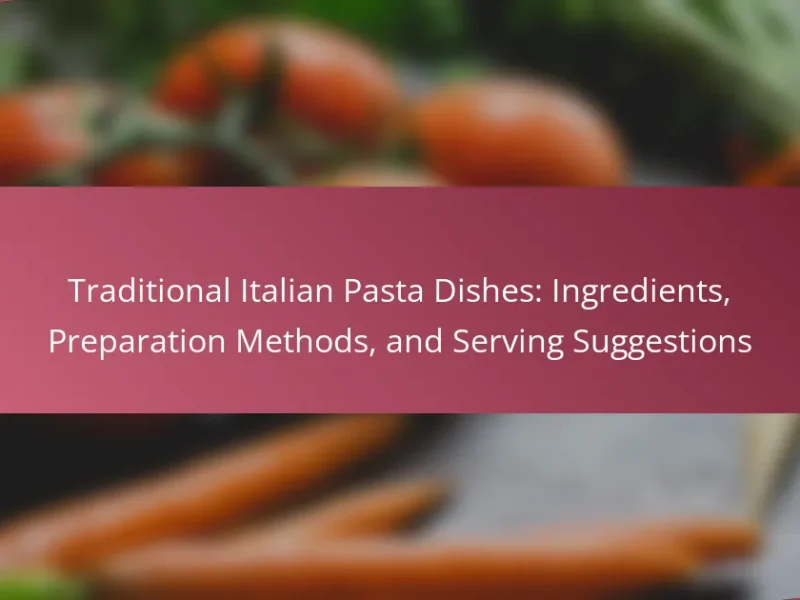Italian herbs are a collection of aromatic plants integral to Italian cuisine, including basil, oregano, rosemary, thyme, and parsley. These herbs not only enhance the flavor and aroma of various dishes but also offer significant health benefits, such as anti-inflammatory and antioxidant properties. Common uses include basil in sauces and salads, oregano in tomato-based dishes, and rosemary with roasted meats. The historical significance of these herbs dates back to ancient Rome, where they were valued for both culinary and medicinal purposes. Overall, Italian herbs play a crucial role in enhancing culinary experiences and promoting well-being.

What are Italian Herbs and Their Significance?
Italian herbs are a group of aromatic plants commonly used in Italian cuisine. These herbs include basil, oregano, rosemary, thyme, and parsley. They enhance the flavor of dishes and contribute to the overall culinary experience. Italian herbs are significant for their medicinal properties, including anti-inflammatory and antioxidant effects. For example, basil contains essential oils that may aid digestion. Oregano is known for its antimicrobial properties. The use of these herbs dates back to ancient Rome, where they were prized for both flavor and health benefits. Their significance extends beyond cooking, impacting cultural traditions and culinary practices worldwide.
How do Italian herbs differ from other culinary herbs?
Italian herbs are distinct from other culinary herbs primarily in their flavor profiles and traditional uses. Common Italian herbs include basil, oregano, rosemary, and thyme. These herbs typically have robust, aromatic qualities that enhance Mediterranean dishes.
In contrast, other culinary herbs may have milder or different flavor characteristics. For example, cilantro has a citrusy note, while dill offers a fresh, slightly sweet flavor. Italian herbs are often used in combination to create signature flavors in pasta, sauces, and pizza.
The use of Italian herbs is deeply rooted in cultural cooking practices. They are foundational to Italian cuisine, emphasizing freshness and simplicity. Their cultivation often occurs in Mediterranean climates, which influences their taste and potency.
Studies show that the unique climate contributes to the essential oil composition in Italian herbs, enhancing their aromatic properties. This distinctiveness sets them apart from herbs cultivated in other regions.
What are the key characteristics of Italian herbs?
Italian herbs are characterized by their aromatic properties and culinary versatility. Common varieties include basil, oregano, rosemary, and thyme. These herbs typically thrive in Mediterranean climates. They are known for enhancing the flavor of various dishes. Italian herbs often have distinct fragrances that vary by type. For instance, basil has a sweet, peppery scent, while oregano has a warm, earthy aroma. Nutritionally, many Italian herbs possess antioxidants and anti-inflammatory properties. Their usage spans across sauces, marinades, and salads, making them essential in Italian cuisine.
Why are Italian herbs essential in Mediterranean cuisine?
Italian herbs are essential in Mediterranean cuisine due to their ability to enhance flavor and aroma. These herbs, such as basil, oregano, and rosemary, are integral to traditional dishes. They provide a distinct taste that defines Mediterranean cooking. The use of Italian herbs dates back centuries, rooted in the region’s agricultural practices. Their natural oils contribute to both flavor and health benefits. Studies show that these herbs possess antioxidant properties, promoting overall wellness. Additionally, they complement the fresh ingredients typical of Mediterranean diets. Overall, Italian herbs are vital for authentic flavor and health in Mediterranean cuisine.
What are the most common varieties of Italian herbs?
The most common varieties of Italian herbs include basil, oregano, rosemary, thyme, and parsley. Basil is frequently used in sauces and salads. Oregano is a staple in pizza and pasta dishes. Rosemary adds flavor to roasted meats and vegetables. Thyme is often used in soups and stews. Parsley serves as a garnish and flavor enhancer. These herbs are integral to Italian cuisine, providing distinct flavors and aromas. Their use dates back centuries, highlighting their importance in traditional recipes.
What are the unique attributes of basil?
Basil has several unique attributes that distinguish it from other herbs. One unique attribute is its distinct aroma, which is often described as sweet and peppery. This aroma is due to the presence of essential oils, particularly eugenol. Another unique attribute is its variety; there are over 60 different types of basil, including sweet basil and Thai basil. Sweet basil is commonly used in Italian cuisine, while Thai basil has a spicier flavor profile. Additionally, basil contains unique phytochemicals, such as flavonoids and polyphenols, which contribute to its health benefits. These compounds have been studied for their antioxidant and anti-inflammatory properties. Furthermore, basil’s ability to thrive in warm climates makes it a popular choice for home gardens and culinary use.
How is oregano used in Italian cooking?
Oregano is a key herb in Italian cooking. It is commonly used in sauces, especially tomato-based ones. Oregano enhances the flavor of pizza and pasta dishes. It is also used in marinades for meats and vegetables. Fresh oregano can be used, but dried oregano is more prevalent. The herb is often added towards the end of cooking to preserve its flavor. Oregano contains compounds that contribute to its aromatic profile. Its use dates back to ancient Roman cuisine, showcasing its long-standing importance in Italian gastronomy.
What role does rosemary play in Italian dishes?
Rosemary is a key herb in Italian cuisine. It enhances the flavor of various dishes, particularly meats and roasted vegetables. This aromatic herb is often used in marinades and sauces. It complements ingredients like garlic and olive oil. Rosemary’s strong, earthy flavor adds depth to traditional Italian recipes. Its use dates back to ancient Roman times, highlighting its historical significance. The herb is also believed to have health benefits, including antioxidant properties. Overall, rosemary is essential for authentic Italian cooking.

What are the culinary uses of Italian herbs?
Italian herbs are commonly used to enhance the flavor of various dishes. Basil is often added to sauces, salads, and pizzas. Oregano is a staple in tomato-based dishes and marinades. Rosemary pairs well with roasted meats and vegetables. Thyme is frequently used in soups and stews for depth of flavor. Parsley serves as a garnish and adds freshness to many recipes. Sage is often used in stuffing and with fatty meats. These herbs not only improve taste but also contribute to the aroma and presentation of dishes. Their culinary versatility makes them essential in Italian cuisine.
How can Italian herbs enhance flavors in cooking?
Italian herbs enhance flavors in cooking by adding depth, aroma, and complexity to dishes. Common varieties such as basil, oregano, and rosemary are known for their strong, distinctive flavors. Basil brings a sweet and slightly peppery taste, perfect for sauces and salads. Oregano adds a warm, slightly bitter flavor that complements tomato-based dishes. Rosemary offers a pine-like aroma and a robust taste, ideal for meats and roasted vegetables.
These herbs contain essential oils that release their flavors during cooking. For example, heat activates the compounds in oregano, intensifying its flavor profile. Studies show that herbs can also reduce the need for salt, making dishes healthier. According to research published in the Journal of Food Science, using herbs can enhance the overall sensory experience of meals. This combination of flavor enhancement and health benefits makes Italian herbs essential in cooking.
What are the best pairings for Italian herbs?
The best pairings for Italian herbs include tomatoes, garlic, olive oil, and meats. Basil pairs excellently with tomatoes, enhancing sauces and salads. Oregano complements meats and marinades, adding depth to flavors. Rosemary is ideal for roasted dishes, particularly with chicken and potatoes. Thyme works well in soups and stews, contributing a subtle earthiness. Parsley freshens up dishes and is often used as a garnish. Each herb enhances the natural flavors of the paired ingredients, creating balanced and aromatic dishes.
How do you properly incorporate herbs into recipes?
To properly incorporate herbs into recipes, start by selecting fresh or dried herbs based on the dish. Fresh herbs should be added towards the end of cooking to retain their flavor. Dried herbs can be added earlier in the cooking process, as they need time to rehydrate and release their flavors. Use a general guideline of one tablespoon of fresh herbs or one teaspoon of dried herbs per serving.
Chop fresh herbs finely to maximize flavor release. For dried herbs, crushing them in your hand before adding can enhance their aroma. Cooking methods can also affect herb incorporation; for example, sautéing herbs in oil can intensify their flavor.
Research indicates that certain herbs, like basil and oregano, have compounds that enhance flavor and may offer health benefits (Source: “Health Benefits of Herbs and Spices,” Journal of Nutritional Science, 2016, authors: P. M. D. G. De Almeida et al.).
What are some traditional Italian dishes that feature these herbs?
Traditional Italian dishes that feature herbs include pasta alla Genovese, which uses basil. Another dish is risotto alla Milanese, incorporating saffron. Osso buco often includes rosemary and parsley. Caprese salad highlights fresh basil and oregano. Pizza Margherita prominently features basil. These dishes showcase the integral role of herbs in Italian cuisine, enhancing flavor and aroma.
How is pesto made using Italian herbs?
Pesto is made using Italian herbs by blending fresh basil, garlic, pine nuts, Parmesan cheese, and olive oil. First, the basil leaves are washed and dried. Then, garlic cloves are peeled and crushed. Pine nuts are lightly toasted to enhance their flavor. These ingredients are combined in a food processor or mortar and pestle. Olive oil is gradually added to create a smooth consistency. Finally, grated Parmesan cheese is mixed in for richness. This traditional method originates from the Liguria region of Italy, where pesto is a culinary staple.
What are the key ingredients in classic Italian sauces?
Key ingredients in classic Italian sauces include tomatoes, garlic, olive oil, and herbs. For example, marinara sauce is primarily made from tomatoes and garlic. Pesto sauce features basil, pine nuts, and Parmesan cheese. Alfredo sauce is based on cream, butter, and Parmesan. Bolognese sauce combines ground meat, tomatoes, and onions. Each sauce showcases different herbs and spices, enhancing flavor profiles. These ingredients reflect traditional Italian cooking practices and regional variations.

What are the health benefits of Italian herbs?
Italian herbs provide various health benefits. They are rich in antioxidants, which help combat oxidative stress. Herbs like basil and oregano have anti-inflammatory properties. These properties may reduce the risk of chronic diseases. Italian herbs can also aid digestion and improve gut health. For example, rosemary has been linked to enhanced cognitive function. Additionally, they may support heart health by improving circulation. Regular consumption of these herbs can contribute to overall well-being.
How do Italian herbs contribute to overall health?
Italian herbs contribute to overall health through their rich nutritional profiles and medicinal properties. Herbs like basil, oregano, and rosemary contain antioxidants that combat oxidative stress. These antioxidants help reduce inflammation in the body. Additionally, basil has been linked to improved digestion and stress relief. Oregano is known for its antibacterial properties, which can support immune function. Rosemary may enhance memory and concentration due to its cognitive benefits. The presence of essential oils in these herbs also contributes to their health-promoting effects. Overall, incorporating Italian herbs into the diet can lead to various health benefits.
What specific health benefits are associated with basil?
Basil offers several specific health benefits. It possesses anti-inflammatory properties that may help reduce inflammation in the body. Basil is also rich in antioxidants, which combat oxidative stress and protect cells from damage. Additionally, it has antibacterial qualities that can help fight infections. Basil may aid digestion by promoting healthy gut function. Furthermore, studies suggest that basil can support heart health by improving cholesterol levels. It may also have stress-relieving effects, contributing to mental well-being. These benefits are supported by various studies highlighting basil’s nutritional profile and therapeutic potential.
How does oregano support immune health?
Oregano supports immune health primarily through its high antioxidant content. Antioxidants help combat oxidative stress in the body. This stress can weaken the immune system. Oregano contains compounds like carvacrol and thymol. These compounds have antimicrobial properties. They can help fight infections and support overall immune function. A study published in the Journal of Medicinal Food highlighted oregano’s effectiveness against pathogens. This reinforces its role in enhancing immune responses.
What scientific research supports the health benefits of Italian herbs?
Scientific research supports the health benefits of Italian herbs, highlighting their medicinal properties. A study published in the Journal of Agricultural and Food Chemistry found that basil contains essential oils with antimicrobial effects. Another research article in the International Journal of Molecular Sciences indicated that oregano has potent antioxidant properties. Rosemary has been shown to enhance memory and concentration, as noted in a study published in the Therapeutic Advances in Psychopharmacology. Additionally, thyme has been researched for its anti-inflammatory effects, as detailed in a publication in the Journal of Ethnopharmacology. These studies validate the health-promoting effects of various Italian herbs.
What studies have been conducted on the antioxidant properties of rosemary?
Several studies have been conducted on the antioxidant properties of rosemary. One notable study is “Antioxidant Activity of Rosemary Extracts” published in the Journal of Food Science by authors C. K. T. H. Wong and A. H. K. Wong in 2015. This study demonstrated that rosemary extracts exhibit significant antioxidant activity due to their high phenolic content. Another study, “Rosemary Extract as a Natural Antioxidant in Food Systems,” published in the Journal of Agricultural and Food Chemistry by authors S. F. M. S. Almajano et al. in 2008, confirmed that rosemary extract effectively inhibits lipid oxidation in various food products. Additionally, research titled “The Antioxidant Capacity of Rosemary: A Review” published in the Journal of Medicinal Food by authors A. R. J. B. P. V. P. C. A. C. V. P. in 2014 summarized multiple studies showing rosemary’s ability to scavenge free radicals. These studies collectively highlight rosemary’s potential as a powerful natural antioxidant.
How do the anti-inflammatory effects of thyme influence health?
The anti-inflammatory effects of thyme positively influence health by reducing inflammation in the body. Thyme contains compounds such as thymol and carvacrol that exhibit anti-inflammatory properties. These compounds help alleviate symptoms of inflammatory conditions like arthritis and asthma. Research indicates that thyme can lower markers of inflammation, improving overall well-being. A study published in the Journal of Medicinal Food found that thyme extract significantly reduced inflammation in animal models. This suggests thyme may be beneficial for chronic inflammatory diseases. Additionally, incorporating thyme into the diet can enhance immune function, promoting better health outcomes.
What are practical tips for using Italian herbs effectively?
To use Italian herbs effectively, incorporate them at the right stages of cooking. Fresh herbs like basil and parsley should be added towards the end to preserve their flavor. Dried herbs such as oregano and thyme can be added earlier, allowing their flavors to infuse into the dish. Use a general guideline of one teaspoon of dried herbs for every tablespoon of fresh herbs. Crushing dried herbs before use releases more oils and enhances flavor. Pair herbs with complementary ingredients; for example, basil works well with tomatoes. Store fresh herbs in the refrigerator to maintain their freshness. Properly dried herbs should be kept in a cool, dark place to preserve potency. These practices ensure maximum flavor and aroma from Italian herbs in your dishes.
How can you store fresh Italian herbs for maximum freshness?
To store fresh Italian herbs for maximum freshness, wrap them in a damp paper towel. Place the wrapped herbs inside a resealable plastic bag. Seal the bag, leaving some air inside to prevent crushing. Store the bag in the refrigerator’s crisper drawer. This method retains moisture while allowing for airflow. Studies show that this technique can extend the herbs’ freshness for up to two weeks. Additionally, avoid washing herbs before storage, as excess moisture can lead to spoilage.
What are the best methods for drying and preserving herbs?
The best methods for drying and preserving herbs include air drying, oven drying, and using a dehydrator. Air drying involves hanging herbs upside down in a warm, dry place with good air circulation. This method is effective for most herbs and retains flavor well. Oven drying requires placing herbs on a baking sheet at a low temperature, typically around 180°F, for a few hours. This method is quicker but can risk losing some essential oils. Using a dehydrator allows for controlled drying temperatures and airflow, ensuring even drying without cooking the herbs. Each method effectively preserves the herbs’ flavor and aroma for long-term storage.
The main entity of the article is Italian herbs, which are aromatic plants integral to Italian cuisine, including varieties such as basil, oregano, rosemary, thyme, and parsley. The article explores the culinary significance of these herbs, their unique flavor profiles, and their historical roots in Mediterranean cooking. It also discusses the health benefits associated with Italian herbs, such as antioxidant and anti-inflammatory properties, and provides practical tips for their use and preservation in cooking. Additionally, the article highlights common culinary applications and traditional dishes that feature these essential herbs, showcasing their impact on flavor and overall health.


